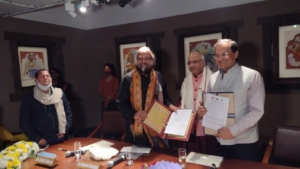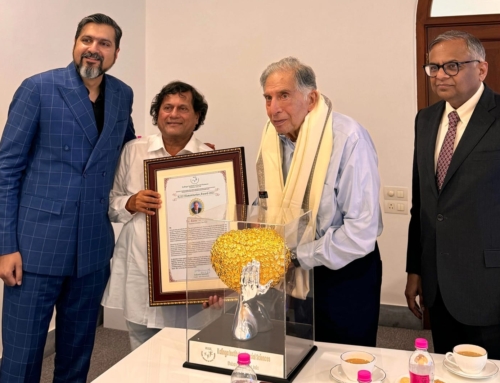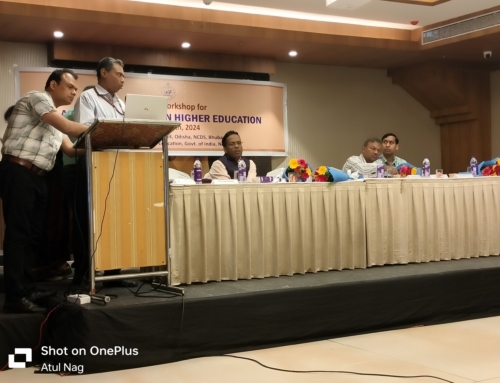Kalinga Institute of Social Sciences (KISS) & Kalinga Institute of Industrial Technology (KIIT), Bhubaneswar signed an MoU with the National Gallery of Modern Art (NGMA), Ministry of Culture, Government of India on 29th November 2021. Dr. Achyuta Samanta, Founder, KIIT & KISS signed the MoU on behalf of KIIT and KISS, while Shri Adwaita Gadanayak, Director-General, NGMA signed on behalf of NGMA in the presence of Dr. Vinay Sahasrabuddhe, Hon’ble MP, Rajya Sabha & Chairman, Parliamentary Standing Committee on Education, Women, Children, and Youth & Sports; Shri Dinesh K. Patnaik, IFS, Director-General, Indian Council for Cultural Relations and Dr. Suraj Kumar, Advisor, KISS.
The agreement is the first of its kind in the history of KIIT & KISS, said Dr. Achyuta Samanta. “The world moves ahead because of imagination. The imagination of today becomes a discovery of tomorrow. Art is an imagination translated into reality by the fuel of inspiration. And as Universities prioritize holistic development, we are happy to chart this uncharted area and hope to work and grow together”, he stated.
As per the MoU, both KISS – KIIT and NGMA will work jointly to protect, preserve and promote tribal art, craft, stories and culture through research and documentation, exhibitions of contemporary artworks, seminars, conferences, and exchange visits for the tribal artisans. This collaboration is an initiative to revive the arts, crafts, and traditions among the young tribal artisans. The MoU will promote and propagate vanishing visual and performing tribal art forms including music, dance, theatre, literature, fine arts. NGMA will provide technical support to KISS & KIIT to encourage higher studies and research in the field of tribal art history, art appreciation, museology, and the inter-relations on visual and performing arts. Further, the MoU aims to develop a specialized library of books, periodicals, photographs, and other audio-visual materials related to tribal art and culture. KISS-KIIT and NGMA will work together and identify areas of cooperation for research, documentation, archiving, and collection of tribal art and craft, with special reference to tribal lifestyle and livelihood.
The National Gallery of Modern Art was founded in 1954. The Gallery is the premier institution of its kind in India. It is a repository of the cultural ethos of the country and showcases the changing art forms through the passage of the last hundred and fifty years starting from about 1857 in the field of Visual and Plastic arts. The NGMA helps people look at the works of modern art with greater joy, understanding, and knowledge by extending their relationship with daily life and experiencing them as vital expressions of the human spirit.






